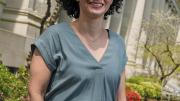“Why do some people get to make decisions about their lives, and other people don’t?” Susan Farbstein, J.D. ’04, clinical professor of law since 2008, first pondered the question after observing the stigma faced by patients visiting her father, a hematologist-oncologist who treated people with HIV and AIDS in the 1980s. Since then, she has continued to think about human dignity and autonomy—and how the law can promote them. After law school, Farbstein worked at the International Center for Transitional Justice (ICTJ) in South Africa on projects seeking “accountability, broadly conceived” for apartheid-era abuses. “It’s not just about criminal accountability; it’s not just about who is guilty,” she says. “It’s also about what the survivor wants”: an apology, structural change, or an opportunity to tell her story. This survivor-centered conception of accountability has helped Farbstein see the law’s impacts beyond legal rulings, shaping people’s understandings of themselves and the underlying events. At Harvard, she leads the International Human Rights Clinic: a group of six faculty and about 30 students who are partnering with a Ukrainian human rights organization to consider how to build a case against Russia for war crimes. Farbstein educates students on human rights law, and also how best to approach such heavy work—by building resilience and avoiding burnout. She does so by returning to favorite hobbies from her California childhood: swimming (“my happy, quiet place”) and hiking with her family. The beliefs she held then continue to motivate her. “At the most basic level, the idea of human rights is that they’re something you’re entitled to by virtue of being human,” she says: “that all people should be able to lead a dignified life, and all people should be able to make choices for themselves about the life that they will lead.”
Susan Farbstein on Human Rights Law
Susan Farbstein on Human Rights Law
Human rights lawyer on law’s ability to promote justice—and shape public understanding

Susan Farbstein | Photograph by Jim harrison
You might also like
What Bonobos Teach Us About Female Power and Cooperation
A Harvard scientist expands our understanding of our closest living relatives.
Eating for the Holidays, the Planet, and Your Heart
“Sustainable eating,” and healthy recipes you can prepare for the holidays.
Five Questions with Michèle Duguay
A Harvard scholar of music theory on how streaming services have changed the experience of music
Most popular
Explore More From Current Issue

A New Landscape Emerges in Allston
The innovative greenery at Harvard’s Science and Engineering Complex

How a Harvard and Lesley Group Broke Choir Singing Wide Open
Cambridge Common Voices draws on principles of universal design.






